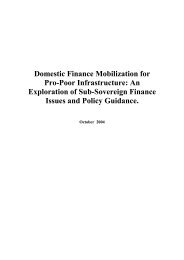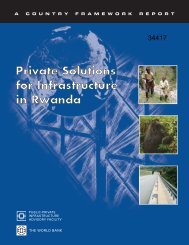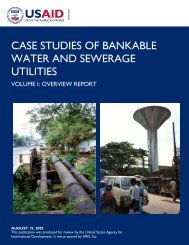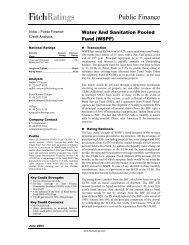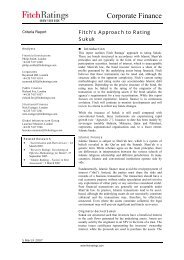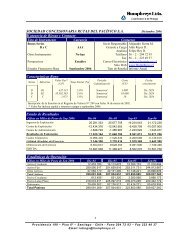EAP - The Pacific Infrastructure Challenge - World Bank (2006).pdf
EAP - The Pacific Infrastructure Challenge - World Bank (2006).pdf
EAP - The Pacific Infrastructure Challenge - World Bank (2006).pdf
Create successful ePaper yourself
Turn your PDF publications into a flip-book with our unique Google optimized e-Paper software.
While private sector involvement may provide good incentives for improved<br />
performance, <strong>Pacific</strong> countries face some challenges to implementing this<br />
successfully.<br />
1) <strong>Pacific</strong> countries are small and remote: Small countries with small markets, far away<br />
from major trading ports are less attractive to the private sector due to lower<br />
revenues. This could make it more difficult for some <strong>Pacific</strong> islands, such as the<br />
Micronesian or Polynesian countries, to attract sufficient private sector interest to<br />
make this a reform option.<br />
However, we in fact observe considerable private sector interest in many <strong>Pacific</strong><br />
markets, including in smaller nations. Private operators are providing services in the<br />
telecommunications sector in Tonga, shipping services in the Marshall Islands, and<br />
port and airport services in countries like Samoa, Vanuatu and Palau. In Kiribati at<br />
least three private operators have indicated interest in producing power as<br />
Independent Power Producers (IPPs) and there are already IPPs operating in the<br />
Federated States of Micronesia and in Fiji. This suggests that private sector interest<br />
exists even for small countries, and may eventuate if only it was encouraged.<br />
Clearly small countries are less attractive to big international operators than large,<br />
high profile countries like China. But the evidence shows that in many cases private<br />
firms would gladly take the opportunity to provide service. We recommend that<br />
rather than assuming that there is no private interest, <strong>Pacific</strong> Governments should<br />
actively pursue PSP opportunities, preferably with the help of experienced<br />
transaction advisors.<br />
2) Private sector involvement may raise already high unit costs of providing service: Since private<br />
operators need to earn profits, some policy makers are concerned that costs will<br />
increase, or that if the market is small, a private provider will be able to charge<br />
monopoly prices. In fact, the evidence from both the <strong>Pacific</strong> and the Caribbean<br />
shows that private providers are generally more efficient than public companies.<br />
Vanuatu’s electricity prices are lower than Tonga and Kiribati’s, both of which<br />
provide service through a publicly owned utility.<br />
Allowing publicly-owned utilities not to earn a commercial rate of return on their<br />
capital is equivalent to providing them with an implicit taxpayer subsidy. If the same<br />
level of subsidy was explicitly applied to private providers, their prices would be<br />
correspondingly lower.<br />
In any case, there is no evidence that publicly-owned utilities are any less prone to<br />
taking advantage of their monopoly status. <strong>The</strong> difference, typically, is that public<br />
utilities dissipate this through inefficiencies, while private entities see to maximize<br />
profits for their owners.<br />
Regardless of whether subsidies are provided or not, governments will need to<br />
ensure appropriate oversight mechanisms are in place to keep prices at reasonable<br />
levels.<br />
3) Private participation may not be politically feasible: Governments are often unwilling to<br />
involve the private sector, fearing loss of control. Private participation may lead to<br />
disruptive job losses. It may also reduce the government’s ability to control the<br />
distribution of benefits in society, such as determining which communities get<br />
services, who does not have to pay their bill, who is awarded construction contracts,<br />
and the like.<br />
Well designed private participation should create enough benefits to be politically<br />
attractive, but the reality is that private participation is risky, and governments are<br />
often not willing to risk changes to systems which, even if they do not work very<br />
well, are at least familiar and controllable. If this is the case, the only option available<br />
will be public sector involvement.<br />
54



